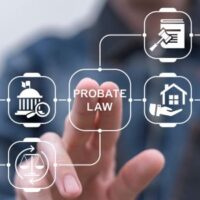Florida’s Non-Probate Assets: What Passes Outside of Court: Part I

So many would love to know: Does this estate really have to go through probate? What can I do to limit what has to go through probate? What do I have to know and what is the quickest way to get through the Florida probate process?
There are some general rules and great information widely applicable to lots of situations – but of course, the devil is in the details and the most precise and useful advice is the advice tailored to your circumstances by a practiced probate attorney. This two-part series will give a general overview of a lot of frequently asked questions about probate, common assets that may be subject to probate, and what might be considered non-probate assets.
Knowledge is power – here are some key things you should know.
What is Florida Probate?
Probate is the legal process that is initiated when a person dies to identify and distribute their estate’s assets in accordance with their valid will, or in accordance with intestacy laws if there is no will. Florida’s probate process is developed under Florida law, and will be different from probate systems found in other states.
What are Probate vs Non-Probate Assets?
“Probate assets” are assets that need to go through the probate process before they are distributed to their new owner. A probate asset is one that was owned in its entirety by the decedent when they died.
Assets can be non-probate assets if they directly transfer to beneficiaries in some way, and, therefore, the assets transfer directly to the beneficiary and are not put through probate. This can be the case with, for example, certain trust assets or jointly owned properties, among other things such as “transfer on death” accounts.
Do Creditors Have a Claim to Non-Probate Assets?
Generally speaking, no- creditors cannot make a claim to non-probate assets. This is because ownership passes directly to the beneficiaries.
What legal requirements apply to Non-Probate Assets?
There are nuances and complex requirements to be navigated in order to ensure an asset is treated as a non-probate asset. For example, explicitly naming beneficiaries is critical. Working with an experienced wills & probate attorney can help you to ensure that you properly collect and create the extensive necessary documentation to suit your goals.
Common Misconceptions
Like any complicated issue, misconceptions are not uncommon in the realm of probate. We would like to quickly touch on a couple of common misconceptions concerning debt responsibility and keeping property out of the probate process.
Probate and Debt Responsibility
A person’s debts do not simply vanish upon their death. Unfortunately, these debts transfer to their estate. If the probate estate does not contain sufficient funds to pay the creditors, some debts might go unpaid. Non-probate assets bypass that probate process and, as stated above, are not available to creditors. An experienced will & probate attorney can discuss this further with you.
Keeping Property Out of Probate – Contact Suncoast Civil Law
While the Florida probate process can be complicated – many strategies exist that can help you to avoid probate. Living trusts, joint tenancy, and more legal tools exist that can help individuals in their estate planning efforts. The experienced Sarasota will & probate attorneys at Suncoast Civil Law can help. Contact our office today to begin speaking with our team.
Sources:
fortune.com/2024/10/08/ultra-rich-secret-trusts-llcs-hide-money-from-spouses/
kiplinger.com/slideshow/retirement/t021-s003-estate-planning-mistakes-celebrities-made/index.html
